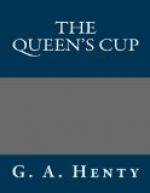While this party was away, another tore down the woodwork of an empty house, and fires were soon burning, an abundance of fowl and goats having been obtained. The cavalry had by this time come in.
While the meal was being cooked the British and Punjaub dead were carried out to the spot where the grave had been dug. The troops had a hearty meal, and then marched out from the village. They were drawn up round the graves, and the bodies were laid reverently in them. Captain Mallett said a few words over them; the earth was then shovelled in and levelled, and the troops marched to a wood a mile distant, where they halted until the heat of the day was over. They returned by the direct road to the camp, which they reached at midnight.
All concerned gained great credit for the heavy blow that had been inflicted on the mutineers, and the affair was highly spoken of in the Brigadier’s report to the Commander in Chief. Shortly afterwards Mallett’s name appeared in general orders as promoted to a brevet Majority, pending a confirmation by the home authorities.
Two days after the return of the little column, the brigade marched and joined the force collected at Cawnpore for the final operation against Lucknow, and on the 3rd of March reached the Commander in Chief at the Dil Koosha, which had been captured with the same ease as on the occasion of the former advance.
They found that while the main body had gathered there, 6,000 men under Sir James Outram had crossed the Goomtee from the Alum Bagh, and, after defeating two serious attacks by the enemy, had taken up a position at Chinhut. On the 9th, Sir Colin Campbell captured the Martiniere with trifling loss. On the 11th General Outram pushed his advance as far as the iron bridge, and established batteries commanding the passage of the stone bridge also. On the 12th the Imambarra was breached and stormed, and the troops pressed so hotly on the flying enemy that they entered the Kaiser Bagh, the strongest fortified palace in the city, and drove the enemy from it.
The ——th was engaged in this action, and Major Mallett was leading his company to the assault on the Imambarra when a shot brought him to the ground. When he recovered his senses he found himself in a chamber that had been hastily converted into a hospital, with the regimental doctor leaning over him.
“What has happened?” he asked.
“You have been hit, Mallett, and have had a very close shave of it, indeed; but as it is, you will soon be about again.”
“Where was I hit? I don’t feel any pain.”
“You were hit in the neck, about half an inch above the collarbone, and the ball has gone through the muscles of the neck; and beyond the fact that you won’t be able to turn your head for some time, you will be none the worse for it. An inch further to the right, or an inch lower or higher, and it would have been fatal. It was not one of the enemy who did you this service, for the ball went up from behind, and came out in front; it is evidently a random shot from one of our own fellows.”




